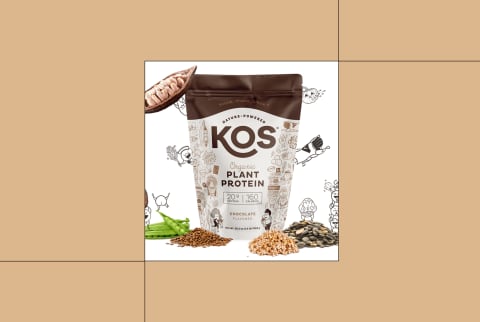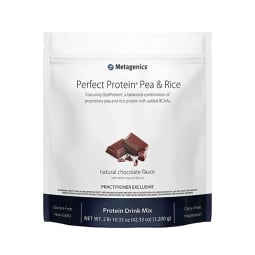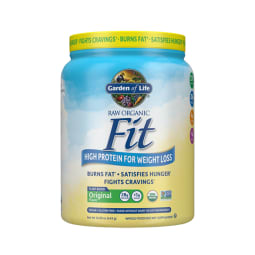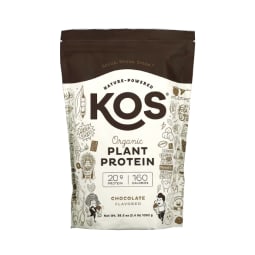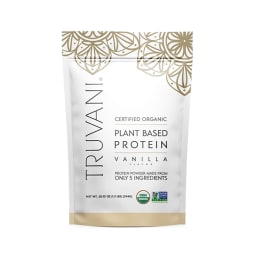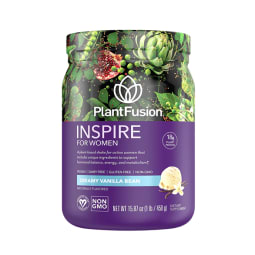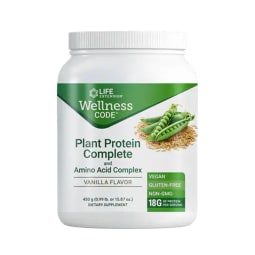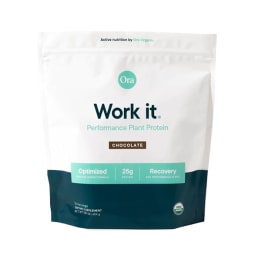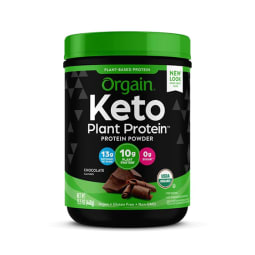In a side-by-side comparison, while no array of plants will offer as many essential amino acids as animal protein, vegan protein powders still represent a complementary and robust strategy to infuse a diverse lineup of essential and nonessential amino acids (the building blocks of protein!) into your nutrition regimen and body. This guide will explore the ins and outs of what makes a well-formulated vegan protein powder and share the eight best options of the year. Every time you eat protein, you’re investing in whole-body health, immune function, and especially muscle growth and maintenance. And since muscles are a prime site for glucose and fat metabolism, protein is also helpful for insulin sensitivity, metabolic health, and cellular energy. Plus, high-quality protein is very satiating3 and can be used to promote healthy weight management4 and healthy body composition5. (Learn more about how to use protein for healthy weight goals here.)* The protein (i.e., the amino acid profile, or array) you’ll find in a plant is not the same as the protein you’ll find in an animal (think: poultry, beef, fish, eggs, dairy, etc). For starters, individual plant proteins (with the exception of soy) naturally do not contain all nine essential amino acids, many of which (especially the branched-chain amino acids, BCAAs) are critical for muscle growth and repair. This means that plant proteins are technically, by definition, “incomplete” and must be combined with other protein sources to build something that starts to resemble animal protein, which is complete. This approach of combining complementary plant proteins (think: beans and rice) to achieve a more comprehensive amino acid profile is something that vegetarians and vegans are very familiar with and lean into daily. One serving of plants is also typically lower in overall protein than a serving of meat. A serving of chicken (3.5 oz) has 32 grams of protein6, for example, while a serving of black beans has 24 grams7. Protein from plants is also less bioavailable than animal protein (e.g., whey). This isn’t to say that we should all swap beans for meat. Plant-based diets have health (not to mention environmental) benefits of their own. And as the leading protein and amino acid researcher Don Layman, Ph.D., explains on his episode of the mindbodygreen podcast, it’s possible to be vegan and still get enough protein. It just takes more effort—and likely more calories, too. That’s where vegan protein powders come in: They’re a more targeted way to help ensure you’re getting enough protein every day. Vegan protein powder is often made from peas, rice, hemp, or soy. More unique plants, like pumpkins, artichokes, and other legumes, seeds, or grains can be used to make protein powder as well. Research shows that plant protein powders can build muscle and promote metabolic health8 just as well as animal-based powders can (when consumed in larger amounts9).* The key is that they need to be well-formulated (with complementary plant protein combinations) to contain all nine essential amino acids—especially leucine, one of three essential BCAAs. Thanks to research we now know that leucine is what triggers mTOR, a key cellular signaling pathway that initiates muscle growth and speeds up recovery, and experts believe we should aim for at least 2.5 grams10 of the amino acid in each meal to support this important physiological process (and supplements can be an important part of obtaining this goal.) For context, whey protein powder (from cows or goats) typically has about 8 to 10% leucine content. Soy is 7.8%, while hemp is 5.1%11. This means, Layman explains, that it would take 23 grams of whey protein to trigger muscle growth and 33 or 34 grams of soy. It can be trickier to find out how much leucine is in combination plant protein powders, as amino acid compositions are not always listed on labels. When possible, you’ll want to go with a protein powder that is transparent about its amino acid content. (We call out a few below.) There are a few reasons to choose a vegan protein powder over an animal-based one, despite its less complete amino acid profile. The most obvious is if you follow a strictly plant-based diet. But some meat eaters might also want to weave more plants into their nutrition regimen and be easier on their personal carbon footprint12 too. Plant protein powders can also contain key nutrients from plant sources (e.g., dietary fiber, and omega-3 fatty acid ALA, to name a couple) that you won’t find in animal-based ones. Plant proteins are convenient to boot; add 1-2 scoops to a smoothie or shake and you’re well on your way to meeting your daily protein needs. Of course, powders do not replace whole-food protein sources; they work together. And even the most complete protein powders can’t build muscle alone. You need to pair them with resistance exercises to see any change in body composition and strength. On top of 20 grams of pea protein per serving (2 scoops), this powder contains an extra 3.5 grams of essential amino acids, which are important for muscle growth. It hits the necessary leucine threshold to gain muscle thanks to added BCAAs, with an average of 2.77 grams per serving. It’s a bit higher in sugar than some other options on this list, though, and its sweetness comes from cane sugar, monk fruit extract, and stevia extract.* What it tastes like: Reviewers note that this sweet protein has a smooth flavor with none of the funky aftertastes you’ll find in other plant proteins. It can be added to smoothies or shakes, or simply blended with cold water. Reviewers note that Garden of Life’s formula is filling and effectively stops food cravings—and it’s very low in sugar to boot. We appreciate that its raw ingredients are certified organic and that Garden of Life is a certified B Corporation for its commitment to sustainability.* What it tastes like: The vanilla, chocolate, and original flavors are subtle and not too sweet, though they do have an “artificial” aftertaste and gritty texture, some reviewers note. However, it’s nothing a well-formulated smoothie can’t fix. Kos prides itself on using organic ingredients, and its lower-impact packaging is made from recycled materials. What it tastes like: Kos powder contains coconut, monk fruit, and stevia for a rich and tasty flavor that reviewers pretty unanimously love. They note that the powder—particularly the chocolate variety—tastes great no matter what you blend it in and is especially delicious mixed with plant milk. What it tastes like: If you have a sweet tooth, this is the plant protein powder for you. As one reviewer puts it, “It’s like cake in a cup without the dairy.” It’s not chalky or grainy and comes in a variety of crave-able flavors including chocolate peanut butter, vanilla chai, and banana cinnamon. Designed specifically for women, the formula also has pomegranate extract to support hormonal balance, ashwagandha to ease stress, L-theanine to rev up focus, and biotin to promote healthy skin and nails as well as help balance blood sugar. Plus, it has added digestive enzymes for gut health and MCTs to enhance cognition and support metabolic health.* What it tastes like: Though the powder does not contain sugar, it’s sweetened with a blend of monk fruit, lucuma fruit, yacon root, and stevia. Reviewers note that this does give it a slight aftertaste, though the flavor is still pleasantly mild and the texture blends very easily into shakes and smoothies. It’s an affordable option that is well-suited for those who are new to the world of protein powders, though we don’t love the plastic packaging or long list of added ingredients (including unspecified natural flavors, seed oils, and xanthan gum). What it tastes like: Reviewers note that this powder has a strong artificial vanilla flavor that can be overpowering, so you need to doctor it up with smoothie mix-ins. These enzymes help assist with digestion to ensure that your body is optimally absorbing and utilizing the protein. Research shows that they can help the body take in more amino acids following a workout, and help maximize digestive comfort along the way. Ora’s formula is complete, but its amino acid breakdown is unclear. Unlike other protein powders that can be taken at any time of day, Ora recommends consuming this one within 30 minutes of a workout to reap the most recovery and muscle-building benefits.* What it tastes like: Ora’s formula has a simple ingredient list, but it has more sugar (from organic coconut sugar and organic stevia extract) than any other option on our list. This leads to a pleasantly sweet taste that goes down extra easy thanks to the digestive enzymes. With its lower protein count, however, this isn’t the best pick for building muscle. Its amino acid count is not listed either. What it tastes like: The taste of this powder is hit or miss among reviewers; some note that it’s easy to blend into smoothies and hot beverages like coffee while others find it too lumpy and artificial for their liking. Eating too much protein13 at one time can cause abdominal discomfort, tiredness, and irritability in some people. Those with existing kidney issues or considerations will want to be extra cautious about protein intake levels and would be partnering with their healthcare provider to achieve nutritional goals. However, some protein powders can contain pro-inflammatory additives like sugar so you’ll want to look for a clean formula with minimal extra ingredients. Conventional whey protein comes with sustainability considerations and won’t be suitable for vegans or those with certain sensitivities. In those cases, vegan protein powder is a good alternative.



